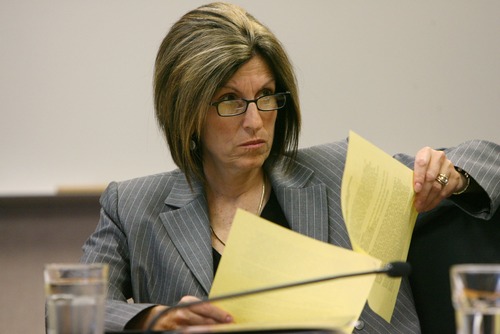This is an archived article that was published on sltrib.com in 2012, and information in the article may be outdated. It is provided only for personal research purposes and may not be reprinted.
As much as half of Gov. Gary Herbert's 22-member Cabinet could change within the next few months as the governor embarks on his first full four-year term in office, Herbert's top aide said.
"The message we're letting people know is the governor's vision is that these aren't careers. These are jobs we have for some period of time," Derek Miller, the governor's chief of staff, said Thursday in an interview.
That means big changes are in store for Herbert's top team.
The governor's senior staff met last week to brainstorm an agenda for the next four years and Miller and Lt. Gov. Greg Bell are interviewing top cabinet-level officials about their plans. Some have already indicated they are planning to retire and Miller said a third to a half of the Cabinet could change.
"It's pretty widely known the governor likes to see the turnover," Miller said. "He doesn't like to see on his boards or commissions, people serving three, four, five terms, and the same principle applies to his Cabinet. He believes in the idea that having a fresh perspective and having a new vision is important."
A handful of the cabinet-level officers have recently changed and seem less likely to leave. Others have much longer tenure, are holdovers from Gov. Jon Huntsman's administration and seem more likely to change.
Utah Department of Transportation Director John Njord has led the state's Transportation Department since 2001 and is well-liked by legislators. But the road for Njord has been rocky in recent years.
First, the department had to pay $13 million to avoid litigation over a bid to rebuild Insterstate 15 through Utah County. And more recently, he fired a whistleblower in the I-15 bid. When the firing was deemed improper, the department was forced to pay back wages to the employee.
Leonard Blackham has been the director of the Department of Agriculture and Mike Styler has been director of the Department of Natural Resources since 2005.
The Utah Department of Corrections has been led by Tom Patterson since 2007, but lately Patterson has been the target of criticism by the association that represents prison guards, which has actively sought his replacement.
And Francine Giani has been the director of the Department of Commerce since 2005 and involved in state government since 1984. This year, she took on the leadership of the Department of Alcoholic Beverage Control after scandal forced a shake-up at the agency. Giani said through a spokeswoman she is not planning on retiring.
Financial Institutions Commissioner Ed Leary has been on the job since 1992 and Kim Hood has headed the Administrative Services Department since 2006.
On policy matters, Miller said the most pressing issue the administration has to prepare for is the looming "fiscal cliff," a series of deep spending cuts and tax increases set to kick in unless Congress acts to avert the crisis.
Beyond that, dealing with the Affordable Care Act, also known as Obamacare, will be time-consuming for the governor's staff.
Miller said Herbert sees his landslide victory as an affirmation that the public supports his direction. The coming term will focus on more of the same priorities, particularly education and economic development.
"Because of the governor's landslide victory, it's a recognition that the path he's been on and the trajectory he's been on is the right one," Miller said. "Carrying 29 counties, and more than half of them by 80 percent or more, is a recognition that what the governor has been doing and the vision he laid out, the people agreed with it."
Miller said the target of having two-thirds of Utahns receive a post-high school certification by 2020 remains a top priority, but the focus now is setting milestones to reach that goal and getting money to early intervention and applied technology programs to make it happen.
At their core, many of the challenges Utah and the governor will contend with in the coming term will be related to growth — air quality, water quality, transportation, education — as well as the growth in immigrant and refugee populations.
Miller said the governor expects to reinvigorate the Envision Utah planning process and the Quality Growth Commission to try to anticipate and react to the needs for the state in the coming years.
He said the governor also plans to put forward a plan within the next few weeks that is a vision for the outdoor recreation industry's role in the state.
"It's not just fluff and window dressing. There will be meat on the bones," Miller said. "It will lay out a challenging course for the next two to four years and recognizes that outdoor recreation and tourism are things that maybe we have taken for granted and shouldn't."
Twitter: @RobertGehrke



